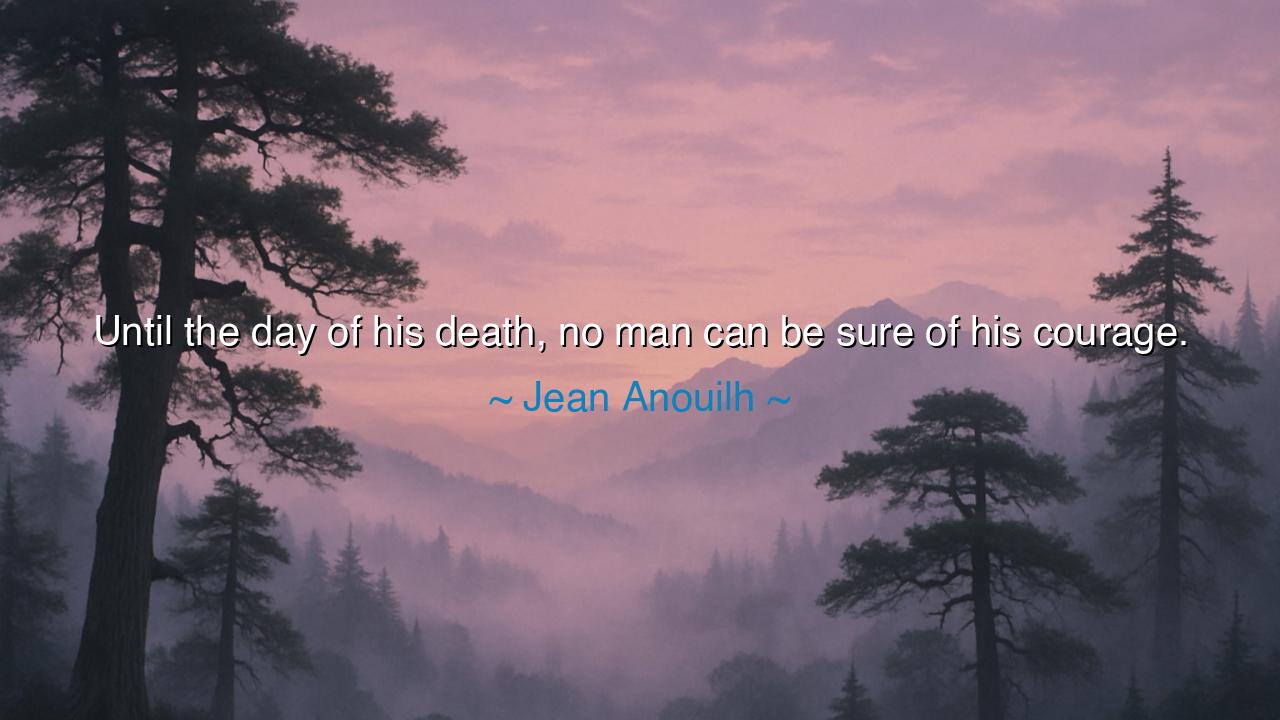
Until the day of his death, no man can be sure of his courage.






In the solemn and piercing words of Jean Anouilh, the French dramatist who understood the hidden struggles of the human heart, we find a truth both humbling and eternal: “Until the day of his death, no man can be sure of his courage.” These words carry the weight of wisdom earned through contemplation of both tragedy and honor. They remind us that courage, though admired by all, is not a fixed possession but a living flame — fragile, uncertain, and tested anew in every season of life. For one may speak of bravery in times of peace, yet only in the hour of trial does the soul discover whether its light will stand against the wind.
The origin of this thought lies in Anouilh’s reflection on the nature of moral strength. Living in France during the dark years of war and occupation, he witnessed men and women whose valor was not born of glory, but of quiet endurance — those who resisted tyranny not for fame, but for conscience. He saw, too, others who spoke boldly of righteousness, only to falter when fear came knocking. From these observations arose his insight: no one can know the true measure of their courage until fate demands it of them. Words and ideals are easy in comfort, but courage — the steadfastness of the spirit — can only be proven under the shadow of danger.
In every age, there have been those who believed themselves strong, only to crumble when tested, and those who thought themselves weak, yet rose in the face of terror with the power of lions. Consider Sir Thomas More, the English statesman and scholar. For years, he was known as a man of intellect and virtue, a loyal servant to his king. But when King Henry VIII demanded that he betray his conscience and acknowledge the monarch as head of the Church, More refused. He was imprisoned, stripped of wealth and title, and led to the scaffold. There, facing death, his courage was made known — not through defiance, but through serenity. “I die the king’s good servant, but God’s first,” he said. Until that moment, even he could not have known the depth of his bravery. For as Anouilh tells us, only when life hangs in the balance does the truth of the soul emerge.
This quote also speaks to the subtle deceit of pride. Many boast of their fearlessness, mistaking recklessness for bravery, or conviction for strength. Yet, as the ancients taught, true courage is not the absence of fear, but the mastery of it. It is not proclaimed in words, but revealed in deeds when silence would be easier. It is tested not in victory, but in loss. The man who has never faced despair cannot claim to be brave, just as the sailor who has never met a storm cannot call himself a master of the sea. Until the final breath — when all comforts fade and the veil of certainty is torn away — courage remains unproven, a potential waiting to be born.
Anouilh’s insight is not meant to humble us into despair, but to awaken humility and vigilance. It calls upon each of us to live as if courage is a muscle that must be exercised daily — in small acts of integrity, in quiet choices of truth over convenience, in compassion where cruelty would be easier. For the great trials do not announce themselves; they arrive suddenly, and only those who have trained their hearts in virtue will stand firm. Thus, he teaches that the path to courage is not found in grand gestures, but in the discipline of the spirit — in honesty, empathy, and perseverance when no one watches.
We may look also to the story of Anne Frank, a child hidden from the world, whose courage was not forged in battle, but in faith. Trapped in fear, she still found hope, writing, “In spite of everything, I still believe that people are really good at heart.” Her courage was unassuming, gentle, and pure — and even she, perhaps, did not know its full extent until her final days. Yet her strength, born of innocence and love, outlived those who silenced her. This, too, proves Anouilh’s truth: we know our courage only by the trials that end us.
So, my child, remember this sacred teaching: never assume your courage is certain. Do not boast of it, nor despair of it. Instead, cultivate it — quietly, patiently, through honesty, compassion, and endurance. For life will test you when you least expect it, and in that moment, your soul will reveal its true measure. Courage is not a crown one wears, but a fire that must be kindled anew each day, lest it grow dim. And when the final trial comes — as it comes to all — let your courage be not loud or proud, but steady, like the flame that does not flicker even when the wind of death blows upon it.
In this way, you shall honor Anouilh’s wisdom: by living not in the arrogance of presumed bravery, but in the quiet strength of a heart ever ready to face the unknown. For only at the end, when all disguises fall away, will the truth of your courage be known — both to the world, and to yourself.






AAdministratorAdministrator
Welcome, honored guests. Please leave a comment, we will respond soon